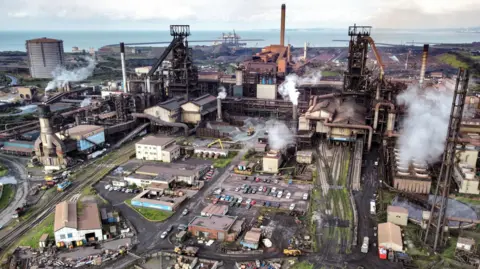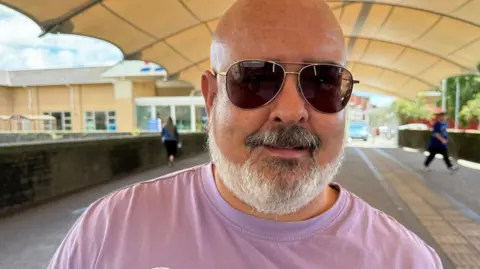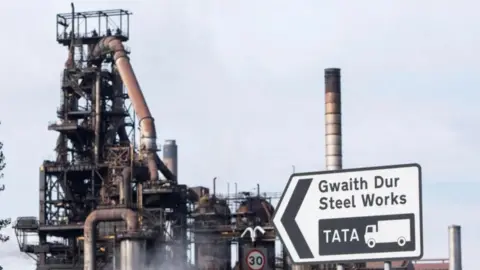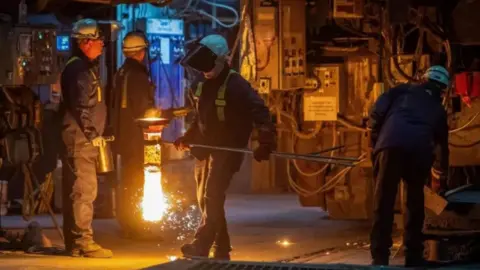By means of Huw Thomas, Trade correspondent, BBC Wales Information • Mark Palmer, BBC Information
The United Kingdom executive’s fresh industry secretary has mentioned “job guarantees” will method a part of the negotiations with metal immense Tata about its Port Talbot web page.
Jonathan Reynolds mentioned there used to be “a better deal available” at the life of the plant, however mentioned more recent applied sciences would make use of fewer folk.
The former Conservative executive assuredly a £500m rescue package to aid book the plant unmistakable and shift to greener manufacturing modes, however 2,800 UK jobs would still be lost.
Mr Reynolds mentioned he and High Minister Sir Keir Starmer had already spoken to Tata and have been all in favour of energetic negotiations over the Port Talbot plant’s life.
“I’m going to make sure that job guarantees are part of the negotiation that we’re having,” he informed Sunday with Laura Kuenssberg.
Pressed on whether or not that supposed he may just assurance all jobs, he spoke back: “Blast furnaces employ more people than some of the newer technologies available.
“So there’s a length of items it’s important to perceive however I completely believe the purpose that we need to form certain that this can be a transition which goes for running folk and that they’re a part of that.”
 PA Media
PA MediaMr Reynolds said the timescale for the government’s negotiations was “now not a immense one”.
He said Labour’s manifesto had pledged £2.5bn on top of the £500m already agreed by the former government.
“It’s now not about underwriting loss making companies in in all probability the way in which we would possibly have considered commercial coverage within the hour. It’s about being a spouse for funding going forward,” he mentioned.
“There may be extra money to be had for the metal business below our plans for presidency, however that’s about ensuring we form this transition with the personal sector in combination and recognise how we need to form certain that decarbonisation isn’t de-industrialisation and we’ve were given to do this in combination.
“But there is a better deal available for Port Talbot and the steel industry as a whole – I’m sure of that.”

Port Talbot citizens had combined perspectives of the untouched trends.
Rachel White lives close the steelworks, however does now not assume it has a long-term life.
“I know a lot of people who work there who were obviously really concerned in the first place when they found out they were going to lose their jobs, but they’ve gone on to find better jobs for the next generation but the steelworks is never going to be a long-term solution,” she said.
“I understand they need to find the money for the people who do need the jobs but I feel like a bit more effort could be made in future-proofing for when it does eventually have to go.
“It’s good for the people who haven’t found anything else. I just think they could do a bit more work on what are the other options.
“We live really close to the steelworks and most people would complain about how dirty it is and the effect it has on the environment and on people’s houses.

Nigel Hunt, who runs a clothing shop in the town, thought the minister’s comments did not go far enough.
“I think it’s going to be empty words frankly,” he said. “I think what they need to do is nationalise a foundation manufacturing industry, an industry that makes world-class steel.
“It makes huge quantities of it and it sells because there is a huge demand for it because there is still a manufacturing industry. The automotive industry, aerospace, tin plate and defence, they’re all Port Talbot steel.
“What’s going to happen to that manufacturing base if this industry goes?”

Before he retired Donald Gwyne-Cooke was a steelworks employee, but he believes steelmaking’s time in the town is over.
“I’d prefer it closed down myself because of the pollution. I don’t like to see people losing their jobs but there are other jobs.”
Chris David mentioned: “It’s the only infrastructure in this town and people rely on it. This has been going on for a number of years now and it’s the backbone of this town and without it it’s going to be difficult for everyone.
“The government says a lot of things, but whether they’ll act on it is another thing.
“They’ve got to show commitment, otherwise nobody’s going to believe them. This new government coming now, hopefully they’ll do something about it and back the people of Port Talbot because they’re hard working and they need some support.”
Sparkle of hope
The idea of future investment offers a glimmer of hope for those who are seeking to mitigate the impact of Tata’s plans.
Labour had discussed supporting future investment in Port Talbot during the general election campaign, and Tata bosses had been open to the idea.
But future investment will not save jobs in the short term. Even Tata Steel’s existing commitment to building an electric arc furnace next year will require far fewer workers than are currently employed in the heavy end of blast furnace production.

Unite union general secretary Sharon Graham said the steel industry had been decimated.
She said it needed investment, job guarantees and procurement legislation that “all UK infrastructure tasks must importance UK metal”.
“We want to again British metal, we want to again British industry – funding goes to be key,” she told the BBC.
Tata Steel UK head Rajesh Nair said he was looking forward to working with the UK government on growing green steel production.
“We will be able to be attractive with fresh ministers over our enthusiastic plans to put money into and develop into Port Talbot with electrical arc furnace steelmaking, and to help our staff via this essential however tricky transition,” he said earlier this week.
 Getty Images
Getty ImagesOne of the steelworks’ furnaces closed on Friday and a second is due to close in September, ending Port Talbot’s ability to produce liquid iron from ore.
The company said the blast furnace operation was incurring losses of £1m a day and was financially unsustainable.
A planned strike for 8 July was cancelled by the Unite union after Tata threatened to shut both furnaces due to safety fears over a staff walkout.
Tata has been in talks with unions since January when it unveiled plans to radically transform its operations to deal with its financial losses and cut carbon emissions.
The blueprint used to be dubbed a “crushing blow” and the “worst-case scenario” by means of unions.




